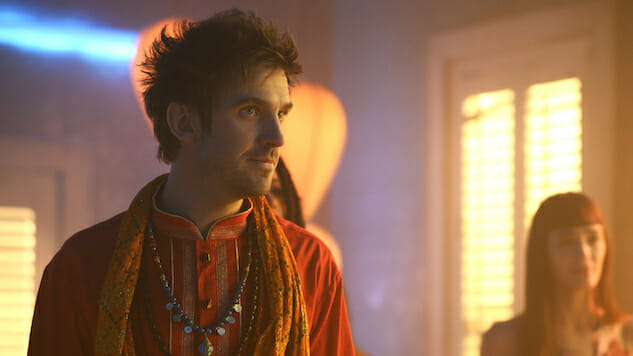The Legion Series Finale Ends as It Always Was: Complicated, Confusing and So Very Human
Legion wasn't ever going to be a show with a traditional happy ending.
Photo Courtesy of FX
![]()
FX’s Legion has never been what you might call an easy watch. Wrestling with ideas of loss and love, time and reality, this is a show that pretty much never spells anything out for its audience. Instead, Legion leaves its viewers on their own to navigate the strange world of its story, which is full of unreliable narrators, offbeat fantasy interludes, bizarre voiceovers from Jon Hamm, and dozens of musical numbers.
Its story is deeply complicated, frequently doubling back on itself to alter our perceptions of events or characters we thought we understood. Heroes turn out to be monsters. Villains become something like friends. Perceptions about what is and is not real change from week to week. As viewers, we’re often left unsure about whether to trust the story we’re seeing, and how to feel about the characters telling it.
The series finale is no different.
Legion ends by giving us another beginning, one that completely rewrites everything that has come before, and asks us to believe that this is somehow enough. That the promise of something is just as satisfying as seeing that same possibility fulfilled, and that it’s this final act of hope—for a fresh start, for a better and different tomorrow—that really matters.
The past is altered, thanks to a deal struck by David Haller’s father, Charles Xavier, and the Shadow King, Amal Farouk, who apparently does love the boy whose body he inhabited for so long. David, his ex-girlfriend Sydney, and all their friends as we know them are erased as a new timeline takes hold, one which promises David a childhood full of all the love and stability he never received during the version of his life we watched unfold over the course of the show.
Will this be enough? The difference between perception and reality, between desire and outcome has always been a key piece of the story that Legion is telling. “Chapter 27” itself certainly seems to imply that things can and will be different for everyone in this bright new future. The series ends on such a hopeful note—David and Sydney reunited, seemingly at some kind of peace with one another—that it’s hard not to believe that somehow, in spite of everything, their lives will all turn out okay.
It’s a leap of faith, one whose answer we will never know. This uncomfortable uncertainty is all part of what makes Legion such compelling television, but it’s certainly a lot more work than your average superhero drama. And that’s probably because it isn’t one. Not really.
-

-

-

-

-

-

-

-

-

-

-

-

-

-

-

-

-

-

-

-

-

-

-

-

-

-

-

-

-

-

-

-

-

-

-

-

-

-

-

-








































